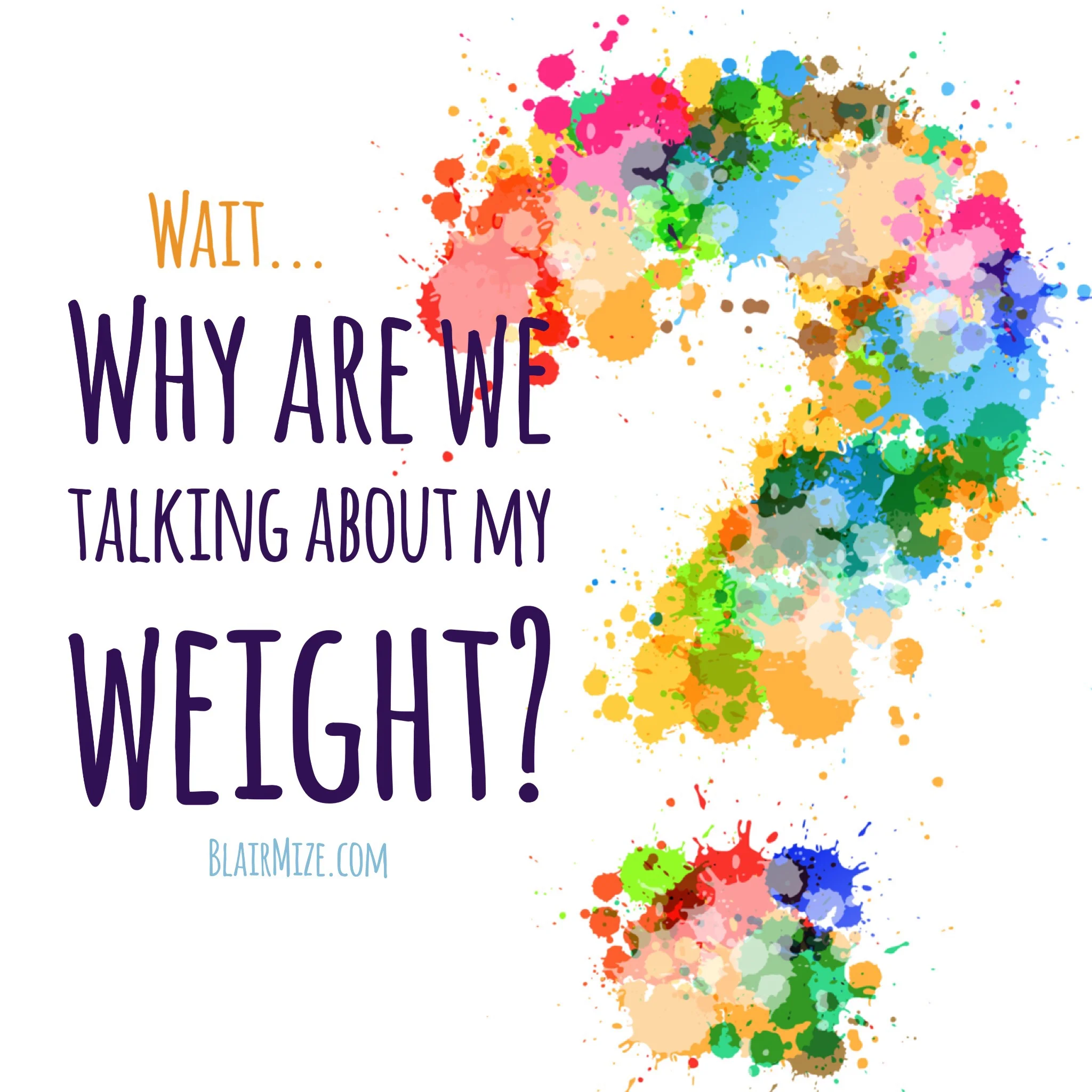Wait...Why are we talking about my weight?
Raise your hand if you look forward to going to the doctor…
Me neither.
Not long ago, I had a check-up that I had been dreading more than usual. I contemplated canceling several times. As I was considering whether or not I would go to the appointment, I thought about all that would be done at the check-up. One of the first things that came to mind was getting my weight checked. Lately, I've encouraged several of my clients to decline weighing at the doctor's office if not medically necessary for their care as few of my clients look at the number on the scale as "interesting data." I felt convicted to practice what I had been preaching to my clients, so I pondered what it would be like if I said "no" to the scale that day. When I started thinking about speaking up and not getting weighed, I -much to my surprise- started to feel nervous...my heart was beating fast!
I've had clients share that it's easier to just get weighed to avoid getting questions or receiving funny looks from the nurse who is in charge of getting vital signs. If this sounds like you, you are not alone. I, too, was wrestling with the idea of refusing to be weighed! Many people fear making their doctor mad, seeming ungrateful for their help, or acting like they know more than their doctor. I've also had clients share that they were treated differently after refusing to be weighed at a doctor's appointment, but it wasn't until this particular day that I began to understand why my clients struggle so much with the scale in the doctor's office.
I chickened out.
It truly felt easier to just step on the scale that day. The nurse took note of my weight. I saw my doctor, expressed my concerns, and attempted to get my questions answered. During my appointment, the doctor was not particularly forthcoming with lots of helpful information, but I was - for some reason- completely shocked at what she was forthcoming about. Right before walking out of the room, she decided to tell me, "And just so you know, you've gained [x] pounds over the last year."
I stared at her blankly, basically in shock, wondering why she felt the need to tell me this information. I certainly hadn't asked about my weight. Before I could formulate a response (or close my mouth after my jaw had dropped), she continued, "You're still fine. It's just something I tell everyone just so they know." I think I managed to utter an puny "OK?" before she left the room.
Immediately, I was so disappointed in myself. I began thinking of all the things I should've said in that moment. Even more, I began thinking about my clients and the weight bias and weight stigma they have experienced. My weight remains in a range that is deemed "healthy" or "normal" by the medical community's [sometimes arbitrary] standards, so I cringed thinking about how this conversation may have gone for a person who was considered "overweight" or "obese." I thought to myself, "No wonder people decide to delay or avoid medical care!"
I also thought about those who have struggled to gain the weight they need to be healthy. Hearing this comment could've been a major trigger for them. What if a patient gains muscle, making them stronger and healthier? What if the patient was recovering from an eating disorder? What about all of the other factors that can lead to weight gain?
Apparently, I'm not the only one who felt terrible about this one-sided conversation. It's estimated that 20-30% of people will be strongly impacted by weight stigma from professionals but will not speak up for themselves, even when they know the truth about weight and health and want to be treated accordingly. The percentage is probably higher for those who receive unsolicited comments about their weight.
When it comes to weighing and weight, what can healthcare providers say and do to respect their patients?
Give patients the option to be weighed or not by asking, "Would you like to be weighed today?" or "May I have your permission to weight you today?"
If the patient says "Yes":
Ask the patient if he or she would prefer blind weighing (facing away from the scale).
Weigh the patient in a private area that allows for confidentiality.
Record the patient's weight without comments.
Get scales for the office that are conducive to doing blind weights regardless of whether the patient turns around or not.
Ask patients: "Do you wish to discuss your weight or health?" or "What do you feel about your health and weight?"
Be sensitive to patients. If you're not going to take the time to ask important questions about the patient's lifestyle and provide answers to any questions that arise, don't take the time to comment on the patient's weight.
Be sure to emphasize behavior changes rather than just the number on the scale.
Avoid simply saying, "Lose weight."
What will I do differently next time (and what could you do in a similar situation)?
Plan and rehearse some responses beforehand to prevent being caught off-guard and subsequently left speechless when comments about weight are made or when asked to step on the scale.
Ask my provider, "How is my weight connected to the medical problem I have?"
Do my best to remain calm and engaged throughout the conversation. Ask as many questions as are needed to fully understand my provider's perspective and assess whether or not it lines up with the research.
Consider sharing research with the provider.
Unsolicited comments about weight are not appropriate. Period. Fortunately, I'm at a point in my life where I feel confident and content with my health, shape, and size. It certainly hasn't always been that way for me, and I'd venture to say it isn't that way for most people in this world. As I look back on this experience, I'm grateful for the opportunity to share my perspective and hopefully prevent similar doctor's office incidents. I've learned a lot from this recent check-up and couldn't let it go before sharing it with you.
I'd love for you to send me your feedback and share your experiences. Have you ever been the recipient of an inappropriate comment about your weight? If so, how did you respond?
If you enjoyed this post, you may also like:


